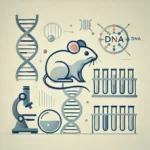A new study, ‘Computational identification of disease models through cross-species phenotype comparison’ by Cacheiro et. Al. (2024), has highlighted how IMPC data can be used to identify new genes contributing to human diseases through computational analysis. The study also looked into how IMPC resources are used by other researchers to identify new disease models.
IMPC characterises single gene knockout mouse mutants which go through comprehensive phenotyping pipelines. The data goes through statistical analysis and where significant differences from baseline are identified, Mammalian Phenotype Ontology (MP) terms are assigned. PhenodDigm is an algorithm developed to identify human gene-disease associations from IMPC data using ontologies. PhenoDigm compares the MP terms to Human Phenotype Ontology terms (HPO), for diseases described in OMIM, ORPHANET and DECIPHER, to systematically identify mouse models for human diseases.
The article used the data available from DR20.1, containing phenotyping data from 8,707 mouse genes. Out of those, they identified 2,742 (31%) genes as having one-to-one human orthologs associated with Mendelian diseases and 2,400 of these had MP and HPO terms assigned. Comparing the ontology terms, 1,311 (55%) genes were identified as having similar traits in the mice and human diseases. Higher rate of disease associations was found in this paper than identified by PhenoDigm in a previous publication by the same authors (Cacheiro et al., 2019). These results reflect the growing accuracy of IMPC data due to increased data volume. Furthermore, when compared to known phenotypic disease matches from Mouse Genome Informatics (MGI), PhenoDigm identified 400 new disease candidate genes.
By analysing publications, the authors also demonstrated that IMPC has contributed to identification of new mendelian disease genes through other researchers by making their data and products available to the scientific community. 109 new gene-disease associations have been discovered through use of IMPC resources as reported in publications.
The authors demonstrates that computational analysis of IMPC data is effective in identifying known and new gene-disease association allowing discovery of new mouse models for human disease. Phenodigm is especially good at identifying endocrine, metabolic and respiratory disorders and with increasing data volume the algorithm will continue to improve even further.
References:
Cacheiro P, Pava D, Parkinson H, et al. Computational identification of disease models through cross-species phenotype comparison. Disease Models & Mechanisms. 2024 Jun;17(6):dmm050604. DOI: 10.1242/dmm.050604. PMID: 38881316; PMCID: PMC11247498.
Cacheiro, P., Haendel, M. A. and Smedley, D. (2019). International Mouse Phenotyping Consortium. & the Monarch Initiative. New models for human disease from the International Mouse Phenotyping Consortium. Mamm. Genome 30, 143-150. https://doi.org/10.1007/s00335-019-09804-5

